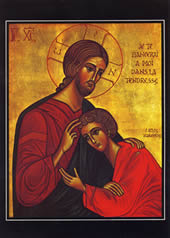John of the Cross
3. Matthew: The Impact of God
Part 2: Gift (continued)

5. The Gospel has eyes (28-34)
‘If only, on your silvered-over face, you would suddenly form they eyes I so long for, which I bear sketched deep within my heart.’(John of the Cross Spiritual Canticle stanza 12)
The Gospels are portraits of Jesus. Jesus knew God in the love-communion that sustained and directed him. Being man, he knew God in faith; that is to say, he chose to believe, and because he was faithful to that choice, he came to the experience the communion for which he longed. He knew that real life consists in this communion.
When he proclaimed: ‘I have come that you may live and live to the full’(John 10:10), he was giving expression to his longing to share with us his own communion with God.

The text is ancient Slavonic: 'Come to me all you who labour and are over-burdened and I will give you rest. Learn from me, for I am gentle and humble of heart, and you will find rest for your souls'(Matthew 11:28-29).
Faith gives knowledge – the knowledge that can come only through love. Recalling Jesus’ words to the Samaritan woman (‘The water that I give you will become for you a spring of water, welling up to eternal life’, John 4:14), John of the Cross in Stanza 12 of the Spiritual Canticle, compares faith to a spring, and goes on: ‘If only, on your silvered-over face, you would suddenly form they eyes I so long for, which I bear sketched deep within my heart.’
In commenting on these lines, John states that ‘it seems that he is now always looking at the beloved.’
Later in Stanza 32 he writes: ‘When you looked at me, your eyes imprinted in me your grace, so ardently did you love me.’
‘You looked with love upon me
and deep within your eyes imprinted grace.
This mercy set me free,
held in your love’s embrace,
to lift my eyes adoring to your face’(SC 32)
It has been said that ‘a person is enlightened’, not ‘when they get an idea, but ‘when someone looks at them.’ A person is enlightened when another person loves them. The eyes are windows on to the heart. They search the person out and have power to elicit life.’
• ‘God’s gaze works four blessings in the soul:
– it cleanses her,
– it makes her beautiful,
– it enriches
– and enlightens her’(Canticle 33.1).
• ‘The Son is God’s face smiling upon the world.’
• ‘In the first place, you should realise that if you are seeking God, much more is your Beloved seeking you’(John of the Cross LF 3,27).
• ‘Where God is concerned, the problem lies in our desiring too little, and growing means expanding our expectations; or rather, making God’s generosity, not our poverty, the measure of our expectations.’
‘Enter within your heart and work in the presence of your Bridegroom who is always present loving you’(John of the Cross Sayings 89).
• The proper response to God's offer is trusting belief which engages desire.
‘Desire with all your soul's desire to come to what in this life lies beyond your mind or the capacity of your heart’(John of the Cross 2Ascent 4.6).
‘Awaken us, my Lord, and shed your light upon us,
that we might recognise and come to love
the blessings that you always hold out to us,
and we shall realise that you stepped forward to show us
your favour and that you have not forgotten us’Jhn of the Cross LF 4.9)
Part III Space
6. The right kind of emptiness (pages 35-38)
• Make space to receive God’s gift which is nothing less that God himself.
• John of the Cross speaks of climbing a mountain. This requires energy and discipline and a lot has to be left behind. He reminds us that the energy comes from God, and that we are to climb only in response to and relying on God's grace. We do not climb alone. God's Spirit is with us.
Iain Matthew writes: ‘John steps out with vigour because the Other’s love has wounded him, and there can be now only one thing to care about.’
John uses the image of allowing the flame to enter into and transform the log.
Also the flame that draws air into itself till it is transformed into flame.
Iain Matthew writes: ‘It is the flame that does the entering, and the essential activity belongs, not to us, but to the Other, to the ‘Spirit of the Bridegroom.’
• He uses another image of unblocking a spring. The spring is from God and God wants it to well up within us, but we have to co-operate with grace to remove what is blocking it.
• In each of these ‘the emphasis is not on our forging a way, but on our getting out of the way.’(Iain Matthew)
Iain Matthew: ‘The summit of the mountain is a huge space – ‘and on the mountain, nothing’ – because it holds a total presence.’ 'The crucial question is not ‘What must I achieve?’, but ‘What stands in his way?’
7. Blockages (pages 39-45)
The Ascent of Mount Carmel
• ‘John proposes a way to break through the circle of our mediocrity.’
• ‘For John created beauty is beautiful – people, art, nature. What concerns him is not so much the person or things being loved, as the loving heart.’
• ‘When desire is out of order, it increasingly causes fatigue, anxiety, confusion, a sense of guilt, and finally an inability to do anything about it. It is a picture of addiction where the person’s dependence is killing him.’
• ‘Establish your freedom by saying ‘no’. No, I don’t need this, I need You!’
• ‘It is denying, not the thing or the person, but one’s dependence on the thing or the person, so clearing a space for genuine communion.’
• A bird held by a thread.
• The issue is ‘affirming a greater love, and transcending one’s cravings for the sake of that love.’
There is no freedom in having my eyes focused in on myself, and my heart twisted back and curled over on itself. I must say No to giving in to this self-centred and self-focused movement and all that emerges from it. I must deny dependence on feelings, on others, on gratification. God is offering himself to me, and I must not allow myself to be absorbed in and distracted by anything that directs me away from opening my heart to God’s Spirit. My longing is to be a person in communion with the persons of the Trinity. This is love, not the false security of isolating myself in meeting my own more demanding and superficial needs.
‘Say No to your desires and you will discover what your heart really desires. What makes you think your longings are God's longings?’(John of the Cross Sayings, 15).
• To live at the level of ‘sense’ is ‘to be hostage to one’s own needs.’
• To live at the level of ‘spirit’ is to ‘live as a person among persons – fit for communion, for the love which can hold the Other, and be held, on open palms.’
It is to ‘make space for the gift of the Other.’
8. Some kind of remedy – Ascent Book I, chapter 13 (page 46-50).
• ‘Essentially the message here runs: choose the person of Christ, and get used to making him, not your feelings, your ultimate basis for action.’
• Begin with a ‘yes’ (a Yes to interior imitation of Christ).
• The ‘no’ is ‘an affirmation of a greater love, a constant longing for Christ.’
• ‘We are being invited to look again at our activities, including their burdensome side, and to commit ourselves to them afresh each day, for God. It is simple. It transfers us to the level of spirit, and opens a space for the gift.’ ‘The whole enterprise is a response.’
‘Who can free himself from his meanness and limitations,
if You do not lift him to yourself, my God, in purity of love?
How will a person brought to birth
and nurtured in a world of small horizons, rise up to you, Lord,
if You do not raise him by your hand – the hand that made him?
You will not take from me, my God, what you once gave me
in your only Son, Jesus Christ, in whom you gave me all I desire.
So I shall rejoice: you will not delay,
if I do not fail to hope’(John of the Cross Sayings 16 - Prayer of the soul in love).
• I have to learn to say: "I don't need this, I need God!" The Yes I say to God is in the context of saying No to my separate self. Only God can enable me to do this, but the spring will not force through the debris, nor the flame drag the log into its consuming embrace.
In the final paragraph of his Ascent of Mount Carmel Book I, John wrote: ‘In self dispossession the heart is at rest. It wants nothing. Because it is grounded on Jesus not on itself. It does not matter whether it feels elated or dejected.’